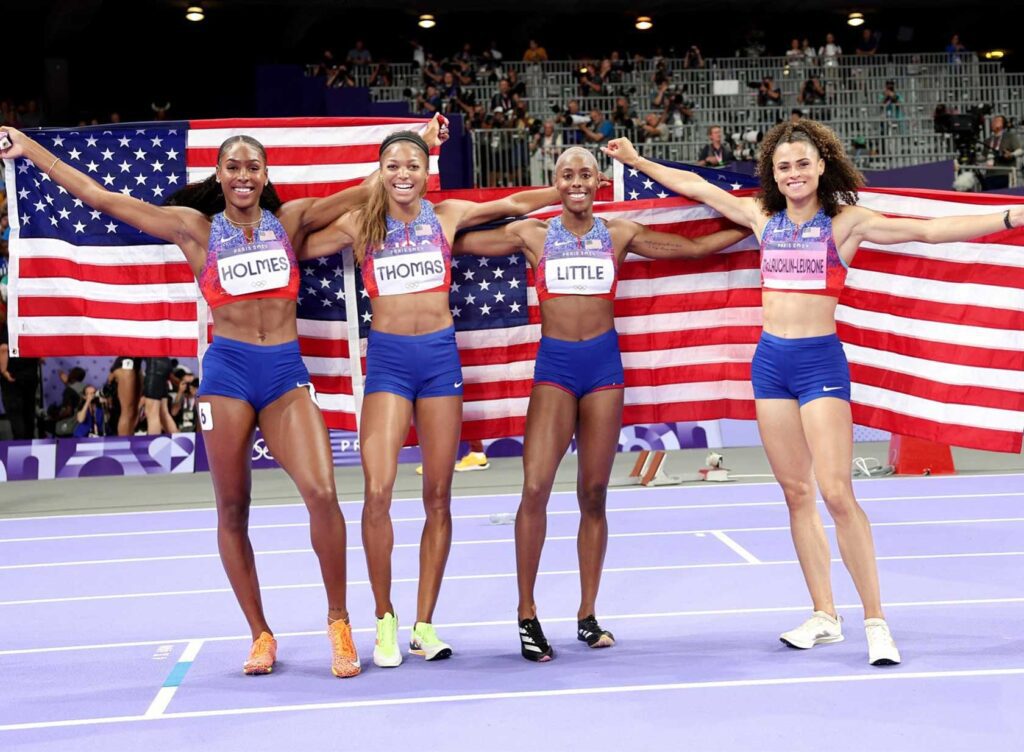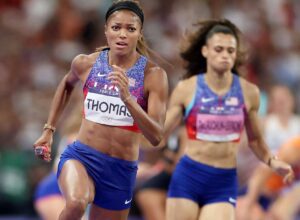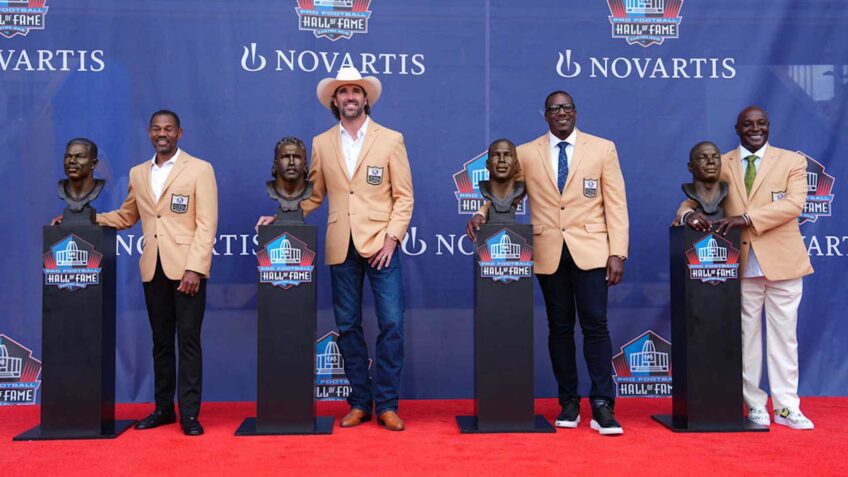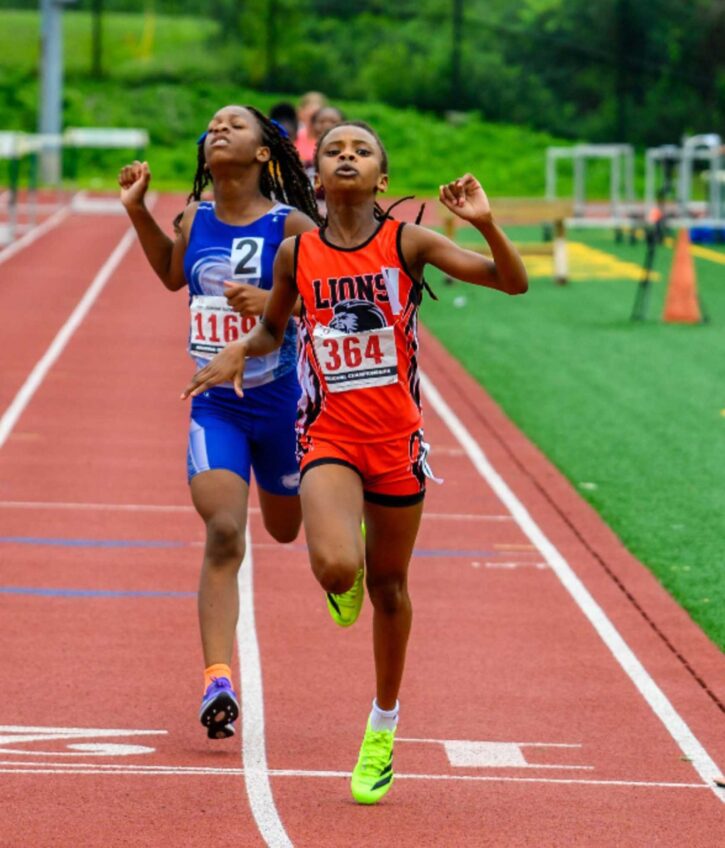
Banner Sports Sponsored by the Patriots Foundation
The final week of the 33rd Olympic Games was a spectacular and failing moment for the United States. Topping the former list was the show-stopping performance of Gabby Thomas, who won three gold medals.
Thomas, raised in Northampton, Massachusetts, rose to fame at the Williston Northampton School in Easthampton, Mass., where she excelled in cross country, basketball and soccer during her prep years. Significantly influenced by her parents Jennifer and Desmond’s passion for education and hard work, Gabby graduated from Harvard University in 2019, majoring in neuroscience and global health.

Gabby Thomas on her way to her third gold medal in the 2024 Paris Olympics. PHOTO: USA TRACK AND FIELD
Her athletic career skyrocketed at Harvard, where she broke multiple school records on her way to becoming an NCAA Champion in the 200 meters. Her breakout moment came in the 2020 Tokyo Olympics, where she won a bronze medal in the 200 meters and a silver medal in the 4×100 relay, setting the stage for her ascendancy to triple gold medal status in the Paris Olympic Games.
After winning gold in the 200 meters, she rose to Olympic royalty with two more gold medals as part of the U.S. women’s 4×100 and 4×400 relay teams.
Teaming with Sha’Carrie Richardson, Melisa Jefferson and Twanisha Terry, Thomas and her teammates overcame rainy conditions to win the gold medal with a season-best 41.78 seconds. Her coup de grace moment came when her teammates Shamir Little, Sydney McLaughlin-Levrone and Alexis Holmes brought home gold in the 4×400 relay event.
While the Paris Olympic Games marked the first time Gabby Thomas would win gold medals, they also placed a golden crown on Sydney McLaughlin-Levrone’s head.
McLaughlin-Levrone, who successfully defended her 2020 Tokyo Olympic gold medal title with a record-setting 50.37 in the individual 400-meter hurdles event, broke her world record in the Paris Games. She also ran the second leg of the 4×400 relay in a blistering time of 47.70 to give the American team a massive lead before handing off to Gabby Thomas. Thomas followed with a 49.30 split before anchor Alexis Holmes glided to the finish line. The team clocked a U.S. record time of 3:15:27, just a tenth of a second off the world record set in 1988, which seemed untouchable until now. McLaughlin-Levrone and her relay teammates hinted that that record could soon fall. The U.S. women have dominated the 4×400 relay, winning eight straight gold medals in the event.
Men’s relay woes
It was a different story for the U.S. men’s 4×100 sprint relay team, which was disqualified in the final due to a mistimed baton handoff between Christian Coleman and Kenny Bednarek. Bednarek appeared to start early, resulting in a delayed exchange that pushed the team out of contention. The U.S. wound up finishing seventh before being disqualified for a pass-zone violation. This disqualification is the latest in a string of mishaps that have plagued the U.S. men’s 4×100 sprint relay team in recent Olympic Games, including 2008, 2016 and 2020.
The last time the U.S. men reached the podium in the 4×100 sprint relay race was in 2004, when they won a silver medal. The current failure of the 4×100 relay team was exacerbated by the absence of Noah Lyles, the 100-meter gold medalist who withdrew from the relay team after testing positive for COVID-19.
Criticism of the 4×100 relay team has come from many circles, including harsh words from Olympic great Carl Lewis. The nine-time Olympic Gold medalist has called for significant changes within USA Track & Field. Lewis’s social media comments criticized the organization for prioritizing relationships over winning. He calls for a complete overhaul of the relay program to prevent future failures.
The U.S. men’s 4×400 relay restored some sense of order by capturing gold in an Olympic record time of 2:54:43, nearly a full second faster than his countrymen did at the 2008 Olympics in Beijing, China. The U.S. team of Chris Bailey leading off, followed by Vernon Norwood, Bryce Deadmon and Rai Benjamin running the anchor leg, was able to hold off a strong finish by Leslie Tobogo, the 200-meter gold medal winner of Botswana. His time of 43:18 enabled him to cross the finish line 0.10 ahead of Tobogo.
Quincy Wilson, the 16-year-old high school student from Maryland, became the youngest track and field athlete in U.S. history to compete and win a gold as part of the 4×400 relay team.
Americans Masai Russell and Grant Holloway were gold winners in the 100-meter hurdles.
In a story that deserves special mention, Sifan Hassan of The Netherlands won the women’s marathon. Her Olympic performance was made all the more spectacular by the fact that Hassan had won bronze medals in the 5,000- and 10,000-meter runs before taking on the challenge of running the 26.2-mile marathon, where she was victorious over Ethiopian Tigst Assefa, the defending Berlin marathon champion. In all, Nassan ran over 40 miles to achieve her history-making goal.
Women’s soccer

U.S. Women’s Soccer teammates Trinity Rodman and Emily Fox celebrate a goal. PHOTO: AURELIEN MORISSARD
The United States women’s national soccer team returned to glory with a 1-0 victory over Brazil in the gold medal contest. Mallory Swanson scored the game-winning goal in the 57th minute to provide the margin of victory. Outstanding goaltending by U.S. netminder Alyssa Naeher made the difference as the U.S. women’s soccer contingent returned to the top of the Olympic podium. Trinity Rodman, the daughter of NBA Hall of Famer Dennis Rodman, along with Sophia Smith and Namoi Girma played starring roles for this young U.S. team that was not expected to win gold this soon.
Credit recently appointed U.S. coach Emma Hayes for her brilliant work of molding this young team together in just 10 games, a gold medal Olympic championship team. It is the first Olympic gold medal for the U.S. women’s national soccer team since 2012.
Bronze controversy
The Paris Olympic Games had controversial moments, with the Jordan Chiles situation gaining significant headlines. The U.S. Olympic gymnast was stripped of her bronze medal for the individual floor exercise because a U.S. protest was not received in time. Chiles was the final participant in her event and was given one minute to protest a scoring ruling to lodge her protest. Video evidence, which was unavailable at the time, clearly shows that Chiles’ coach, Cecile Landi, submitted an inquiry into Chiles’ score within the allowed one-minute time frame, precisely 47 seconds after the score was posted.
This evidence directly contradicts the earlier ruling by the Court of Arbitration for Sports (CAS), which stated that the inquiry was four seconds too late, leading to the decision to reduce Chiles’ score and award the bronze medal to Ana Barbosu of Romania.
USA Gymnastics has submitted the newly discovered video evidence and a formal letter to CAS requesting that they reinstate Chiles’ original score of 13.766 and she retain her bronze medal. USA Gymnastics emphasized that this video was unavailable during the initial tribunal decision and needed to be presented earlier.






